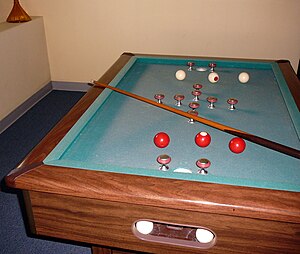
- Image via Wikipedia
The easy answer is that we would like to turn something out of nothing. While many of us are not in the entrepreneurial field, that is the one thing that we all quest after. It is the need to turn a problem into a solution using nothing but you mind and your ability to be more stubborn than anyone else on the issue. In the end, we would all like to make money simply by having a good idea and following it to its logical conclusion. We would like to be better than anyone else that one thing, even if we can admit that it will never quite happen like that.
I have spent much of my life running away from the fact that ideas are worth something more than just to a notebook or a blog. The entire open source aesthetic that I subscribe to is nothing more than my unwillingness to assign a value outside of a particular community of users. My penchant toward non-profit and public service is hypocritical because of the way my mind works. I am constantly seeking something that no one else knows or has figured out yet. It is (even if it is short-sighted) my greatest achievement to have people look to me for expertise that is not shared with others. The very fact that my name can be affixed to things and I can call them mine is what makes me an entrepreneur.
This is not to say that cockiness makes me an enterprising fellow. Quite the opposite. It is because I feel as though I have yet to prove my worth to those people around me that I must reach deeply into myself and produce some value from where they was none before. It is a lack of confidence in speaking, writing, and thinking that makes me want to completely change my approach and overcompensate to achieve my goals. And I believe that it is a lack of confidence that is behind all great ideas. True accomplishment is in competing with your self-doubt, and emerging triumphantly.
And I know because I used to sell super rubber bands in grade school. Flicking a rubber band was an art in those days. Whether you were twisting behind your thumb to fashion a finger gun or simply drawing it back over your nail, there was only so much aim and power that could be imparted on a single band. That is why I decided that my tripple looped super rubber bands were far superior. I would fashion them through a sophisticated knot system so that they looked like mickey mouse by the end of the transformation. They produced far better accuracy and could be shot from over triple the distance away.
I sold them for 15 cents a piece and in the few short days before the operation was shut down, business was booming. I had created something that other kids wanted, even if it was only because I capitalized on a fad (and the fact that boys liked flicking rubber bands at pretty much everything). Unfortunately, I got greedy. I brought my entire stash of rubber bands into gym class and began an ill-fated rapid fire demonstration. The gym teacher confiscated them, and I received my one and only trip to the principal’s office during grade school. After it was all done she said, “I think you can get some other rubber bands. These ones don’t really need any more of your attention.”
And that was that. I had established a perfect product-market fit, but there were external pressures on the marketplace (in the form of unfair regulatory practices) that lead to me having to close up shop. And yet, those moments never really left. I knew that having something other people truly wanted was exactly where I wanted to be for the rest of my life. While that didn’t always translate into entrepreneurship, it did make me want to become the most specialized at any given discipline until I became an integral part of the process, until I had something that other people did not.
And while this may all sound quite ambitious, I am not at all convinced that this need to be useful unique or that is tied specifically to selling “things.” Even open source programmers are trading upon favors and recognition. Even non-profits are funded based upon who they know and what they can achieve. Organizations and people that have not found a significant niche, will soon be obsolete. And that is why we are all entrepreneurs.
We are trying to parlay our skills into something that someone else will pay for. We are making ourselves and our ideas a commodities. It is just that some people (those in business, mostly) are much more outright about their intentions. Many, if not most, hide the fact that they are a commodity. They would like to think of themselves as having a higher purpose or simply that their work does not define them. While I feel as though you can aspire to those things, I do not think that either is terribly true.
Wanting something for yourself is what being an individual is all about. It is impossible to have the self-esteem needed to get up in the morning if you didn’t want people to value you and your contributions. As for being defined by things other than work, there isn’t much evidence to support that idea. While the thing you do for a paycheck may not define who you are, the work that you do (even if you call it play) on the things that you love is what you would like to be known for. You would like to be able to do those things and have people write you a check or at least feed you and your family for them. And yet you remain shy about working toward it. Why?
What could be so significantly terrifying that would cause us to be afraid to attribute value to what we do and ask people to support that value on a regular basis? What will it take so that we can all come together and create a true knowledge exchange so that our best ideas and products and truths do not pass by without being worth something?
Perhaps if we all owned up to our entrepreneurial leanings, that would be a start. And if not that, perhaps just admit that we all sold something in elementary school. Whether it was a toy that we traded, invention or lemonade, we created an underground economy for pennies and dimes. It is not a phase we all went through. It is something that guides our decisions every day. We are all entrepreneurs. It is just that some of us don’t make any money at it.
Related articles by Zemanta
- No Free Lunch for Ning Users; Still Plenty of Bargains Elsewhere (readwriteweb.com)
- Cut Giant Rubber Bands Out of Used Gloves [Clever Uses] (lifehacker.com)
- Teaching My Child to be Entrepreneurial (startups.com)

![Reblog this post [with Zemanta]](https://i0.wp.com/img.zemanta.com/reblog_e.png?w=1225)














